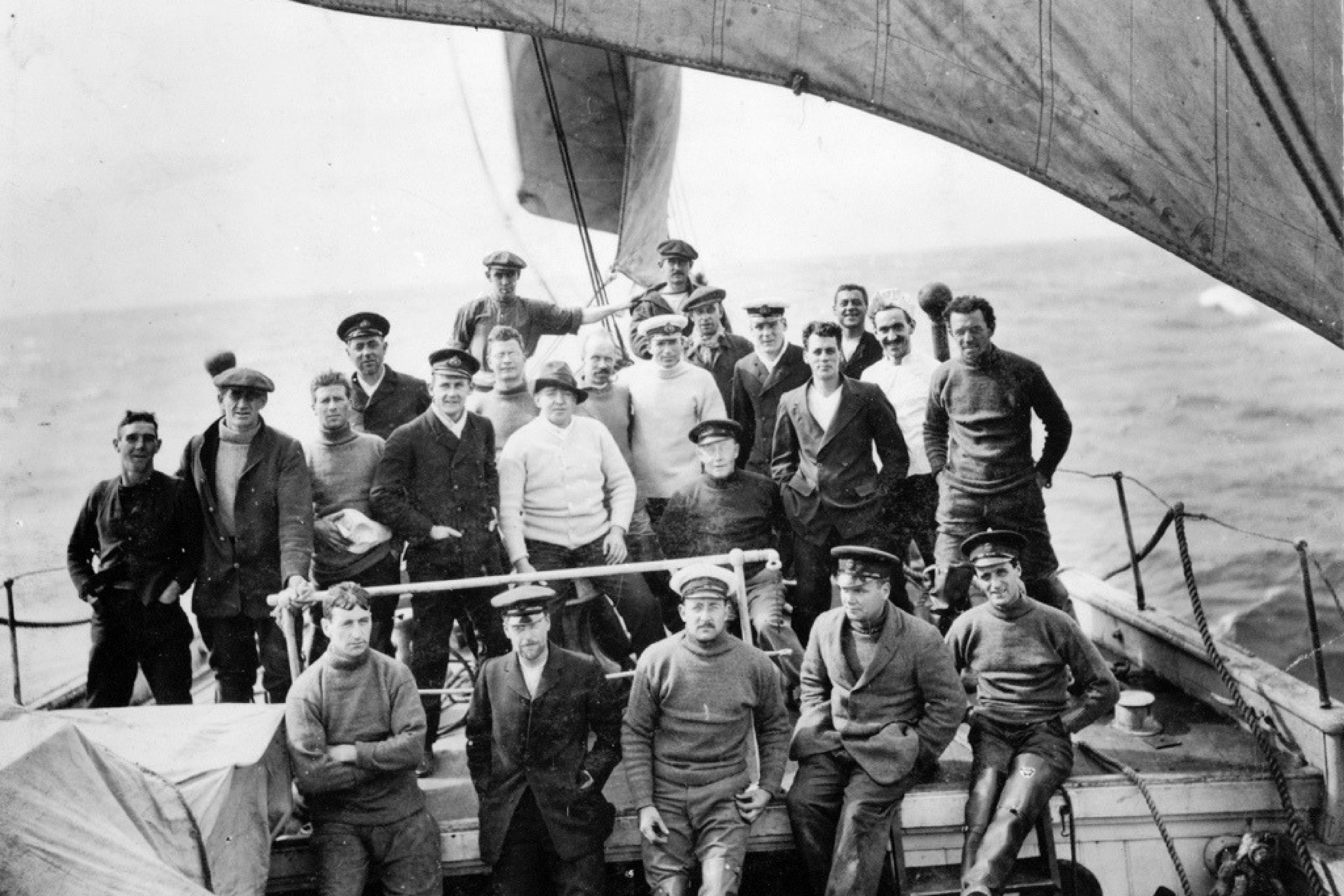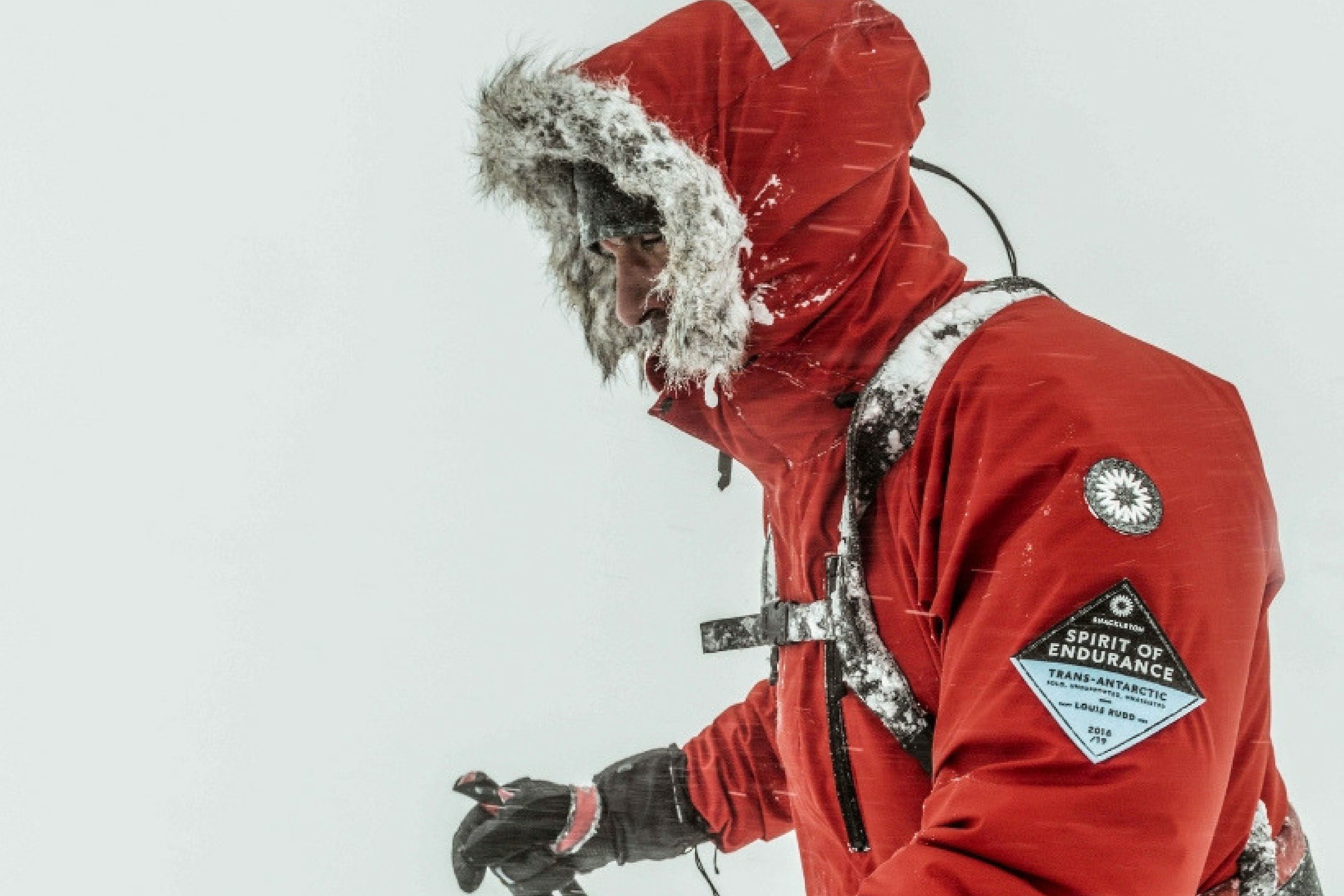
Chasing Shackleton
For over two months and more than 1,500 kilometres, he’ll go head-to-head with nature’s most brutal and inhospitable environment. Temperatures will drop as low as -50C. Winds will gust upwards of 100mph. The elevation above sea level will reach 10,000ft.
Lou's ultimate aim is to be the first person to cross the continent without assistance and without support. His relationship with Antarctica is deeply personal. Three years ago, Lieutenant Colonel Henry Worsley, the man who mentored him on his first polar expedition in 2011, lost his life trying to complete a solo trans-Antarctic mission of his own. He fell 30 miles short attempting to emulate his hero Ernest Shackleton. Last year, in tribute to his fallen companion, Rudd, who has served with the Marines and British Army for 33 years, led the SPEAR 17 expedition - made up of six Reservists - as they successfully completed their own unassisted journey via the South Pole to the Ross Ice Shelf.

While his upcoming ‘Spirit of Endurance’ expedition - named with a dutiful nod to Shackleton and the Heroic Age of Antarctic Exploration - will follow a similar route, the 49-year-old knows this journey will be different. Each evening when he pitches his tent, there will be no arms around the shoulder or playful jokes to share. Other than those he mutters to himself, there will be no words of encouragement each morning. On paper, it sounds unnervingly daunting so, unsurprisingly, he’s eager to re-frame the challenge of such a prolonged period of solitude.
“I’m trying to view it that I’m not on my own,” he explains, “There will be so many people out there supporting me, willing me on and watching my progress, they will be with me all the way.”
His hugely supportive family - wife Lucy in Hereford and children Luke, Amy and Sophie - will be following back home. Real life will be temporarily suspended for all of them. It’s the prospect of a return to the UK, and a delayed Christmas celebration, that Rudd will use to drive himself.
"I’m there to do a job,” he makes clear. “I will place everything that I know and love, everything that I hold close to me, at the finish line. Then I’ll tell myself, ‘The only way you’re getting any of that back is to complete the journey. Everything you love is there in a package on the other side of the continent.’
“I’m trying to view it that I’m not on my own... There will be so many people out there supporting me, willing me on and watching my progress, they will be with me all the way."

He adds: “I will never allow myself to think it’s time to give up, that I can call the plane and get picked up and get home earlier. I won’t allow myself to think about that as an option, the only way I’m going to survive and come out of this alive is by skiing to the end point, that’s it.”
Daily check-in calls via Sat phone will provide a brief chance to interact with those keeping tabs on his progress. He’ll have letters to read at various stages and, on Christmas Day in ‘some random spot’, a few ‘super-lightweight’ presents to open. Thanks to his iPod, Bruce Springsteen and U2 will also play their part in keeping him company and the trials and tribulations of his polar peers, Roald Amundsen, Robert F. Scott and Shackleton, brought to life via audiobooks, will bring day-to-day inspiration.
Being able to call upon a variety of coping mechanisms will be vital, especially on those bleak days when the elements bear down on him and his target mileage is stymied. It’s particularly apt therefore that Rudd’s adventure will raise money for The Royal Foundation’s ‘Heads Together’ charity, which aims to raise awareness of mental health issues and provide support for sufferers, including former servicemen and women. His efforts will also raise funds for ABF The Soldiers’ Charity, which offers a lifetime of support to soldiers, veterans and their families.
In his darkest moments, Rudd aims to remind himself that he’s fortunate to be where he is. “I’m able-bodied, I’m fit and healthy, I’m lucky I’m actually able to go and attempt these kinds of thing,” he says. “[Telling yourself that] stops you feeling sorry for yourself, as does knowing you’re fundraising for a great cause.”
“When I’m on the journey, I’ll accept my life for what it is. I will ski and pull. That will be my only purpose. I’ll try to forget the outside world, things like warm beds and hot showers. I’ll take the view that those things don’t exist.”
Such a singular focus is important, not least because of the risks posed to his health by the physical strain. He can’t afford to lose concentration for a moment. Snow blindness, frostbite - which he experienced in the tips of his fingers in 2011 - sunburn, dehydration, constipation, blisters and exhaustion will all be a threat. Knowing that overheating leads to damp clothing, which in turn could trigger hypothermia, his aim is to be ‘comfortably cool’ whenever possible.
“I’ve never hauled anywhere near that kind of weight before,” he admits. “All my previous journeys have been much lighter and involved less food, so that’s going to be a real challenge, just the physical man-hauling side of it.”
“When I'm on the journey, I'll accept my life for what it is. I will ski and pull. That will be my only purpose. I'll try to forget the outside world, things like warm beds and hot showers. I'll take the view that those things don't exist."
There’s also the very real danger of broken bones, or worse, caused by the terrain. Katabatic winds, downslope gales created when the mountain surface is colder than the surrounding air, and the draining slog of sastrugi will both test his mettle.
“Sastrugi is a major issue in Antarctica,” he explains. “You get these ridges of rock-hard ice formed by the wind. It’s potluck what levels of sastrugi I’ll get. I could have endless miles of it which will really hamper progress.
“It’s essentially like skiing across a lemon meringue pie. The surface will have ridges anywhere between 30 cm to three feet high. You get over with your skis but then your pulk [low-slung supply toboggan] will tip over and your progress will slow to a crawl. I might only achieve four or five miles in ten hours of skiing and a run of days like that will threaten the timing and my food supply.”
As for crevasses, Rudd knows they could be fatal. In planning his route, he’s tried to mitigate the risk of falling into a crack in the ice and he’s also been training his eye to spot danger.
“I’ve gone for what I believe is the safest possible route for a solo crossing of Antarctica,” he notes.
“I have experience spotting the subtle differences in the snow surface and if I’m unsure I can always test the snow bridge with my skis to make certain the surface is strong enough. There’s also the option to ski around some of the crevasses, although you might need to go a mile or so to find a suitable crossing point. It’s just about being really cautious.”
On average, Rudd will ski for ten to 12 hours a day in 70-minute shifts before allowing himself five-minute breaks. As he reduces his load by working through his meal supplies, he’ll gradually increase his daily mileage. On a good day, he’ll cover 13 miles.

To power himself, he’ll consume around 6,500 calories a day. It may sound like a lot, but given he’s burning over 10,000 calories a day, approximately the same as a rider on the Tour de France, extreme weight loss is inevitable.
“In the morning, I’ll have my breakfast bag,” he explains. “It’s super lightweight, freeze-dried rations, things like porridge and granola that you rehydrate. I’ll melt snow to make water to boil and get 1,000 calories there. Then I’ll have a hot chocolate drink, which is another 500-600 calories.
“When I’m skiing, I don’t really stop for lunch or meals, you have a thing called a grazing bag. I’ll have a freezer bag in my pocket with broken up chocolate protein bars, nuts, a bit of dried fruit, cheese and salami as well. I’ll graze throughout the day."
“In the evening, I’ll have a main meal like spaghetti bolognese, chilli con carne, chicken tikka with rice - there are lots of different meals which is great. Along with a protein drink, that’ll take me past 6,000 calories for the day.”
Top-level athletes often talk about the importance of marginal gains - the notion that performance can be improved through the aggregation of small improvements. For Rudd, cutting down on excess weight has been imperative. He’s spent considerable time scientifically honing his packing list and kit.
“The amount of knowledge I’ve gained over the last 12 years since that original journey with Henry [Worsley] is huge. I’ve made improvements across the board in everything, the tents, the cookers, sleeping bags. It’s just incredible.
“I thought I had the gold standard on SPEAR 17, but in two years technology has moved on. I’ve much better options for my sleeping and cooking system and crucially, I’ve saved weight. Weight is everything for long-range polar journeys. If you can save grams somewhere and do that across your whole range of kit, it’ll add up to two to three kilos.”
Following preparatory trips to Norway, Greenland and most recently Iceland, the final countdown is on for Rudd. After months of fundraising, his eagerness to get going is palpable. For a start, there’s the chance to indulge his love of what the polar community call The Great White Queen.
“I absolutely love Antarctica, just the sheer vastness of it,” he says. “It blows me away every time. The scenery is absolutely stunning, it’s real, raw beauty, completely untouched by mankind.”
What’s more, the poignancy of the journey has added to a sense of fate. “It feels like the planets have aligned for me to have a go at this journey. It almost feels like my destiny that I should be the one to crack this.”
In the opening lines of Shackleton’s book ‘The Heart of the Antarctic’ - a reflection on his 1909 failed attempt to reach the South Pole - he wrote:
“Men go out into the void spaces of the world for various reasons. Some are actuated simply by a love of adventure, some have the keen thirst for scientific knowledge, and others again are drawn away from the trodden paths by the ‘lure of little voices,’ the mysterious fascination of the unknown.”
We can only hope those ‘little voices’ keep Rudd company, every step of the way.

Click HERE to donate to the ABF The Soldiers' Charity

Click HERE to donate to the Royal Foundation Heads Together
READ MORE IN SHACKLETON'S JOURNAL

